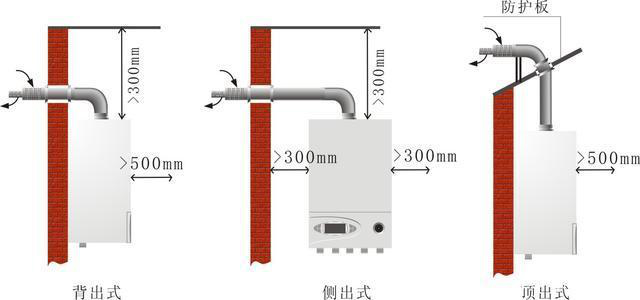Many owners are annoyed by smoke or poor exhaust in the […]
Many owners are annoyed by smoke or poor exhaust in the kitchen at home. They thought it was because the range hood was not working well. In fact, this situation has a lot to do with the original method of installing the exhaust pipe.

The auxiliary flue must be kept
Every kitchen has a flue, and there are main and auxiliary flues. The main flue runs through the entire building, while the secondary flue is relatively independent. It is separated from the main flue by a partition with holes, and the upper and lower are sealed by the floor. Generally, the oil fume in the home will first enter the secondary flue to make a buffer, and then enter the main flue through the hole on the partition, so as to ensure that the oil fume of each household is isolated and will not smoke.
The main and auxiliary flue must exist at the same time. The phenomenon of inverted smoke or stringing of smoke in some homeowners’ homes is probably due to the mistakenly connecting the smoke exhaust pipe to the main flue during decoration, or the removal of the secondary flue in order to save space. If it is directly connected to the main flue, because of its strong upward suction, it can be compared to the "cupping effect". Once the air pressure is relatively low, it may suppress the oil fume from other homes. The auxiliary flue has a good buffer function, so it cannot be removed.
According to some owners, the house's smoke exhaust effect is not good, and the auxiliary flue is smashed, and then the smoke pipe is bent upward by 45 degrees, so that part of the problem of smoke return is eliminated. Is this really okay?
Even if the smoke exhaust pipe is turned upward, it will still cause smoke and smell in the home. Although a check valve can be used for isolation, if the check valve is not cleaned frequently, it will not close tightly, and there will still be smoke and odor. And if everyone uses this method, it will take up a lot of space in the flue, resulting in poor smoke exhaust.
Pay attention to construction details
It is very important to choose the location where the range hood is installed. Make sure to keep the pipe as short as possible. Some owners will stretch the pipe longer for aesthetic reasons. In this way, after turning off the range hood, a lot of oil fume will accumulate in the pipe and cannot be discharged, and then it will be returned indoors.
In addition, in order not to damage the original main and auxiliary flue, its opening direction is not arbitrarily changeable, it must be in the auxiliary flue. The owner cannot change it at will according to his own preferences. However, the hole of the flue can be enlarged, but be careful not to damage the baffle of the secondary flue.
Now some owners will choose a lower exhaust range hood, the flue hole is opened below, and the smoke is discharged down to the bottom of the auxiliary flue. Will this affect the smoke exhaust? The owner can rest assured that all the oil fume will be discharged upwards in the main flue, so that the so-called "cupping effect" will be more obvious, and the phenomenon of odor will not be easily generated.
Pay attention to safety when exhausting smoke from windows
In order to avoid the problem of smoking, some owners abandon the original flue and directly open holes in the windows to exhaust smoke. This is also possible, but there are a few points to note. First of all, you must get the consent of the property before opening windows or walls. In addition, there is a security issue. Generally, the end of the exhaust pipe is made of metal. If the hole is too small, the heat transfer of the metal may cause the glass to burst and hurt pedestrians. In addition, the smoke pipe leads to the outside of the window, and the strong north wind blowing against it will cause the lampblack to flow backwards, increase the load of the range hood, and shorten the service life of the range hood. The best solution is to lower the pipe after the pipe is extended, so as to prevent rainwater from flowing into the pipe when it rains and keep the wind out.
Frequent replacement of check valves
If you have already removed the auxiliary flue or need to prevent the smoke from falling down, experts recommend that you use a flue check valve. Many owners will question why the range hood already has a check valve, why should a flue check valve be installed? Under normal circumstances, the effect of the check valve of the range hood is not very significant, and installing a check valve in the flue can protect the range hood so that the smoke in the flue will not flow back into the pipe and the range hood. However, the check valve should be cleaned regularly after installation, otherwise the check valve will be open and lose its effect. And the flue check valve is best replaced every two years or so.